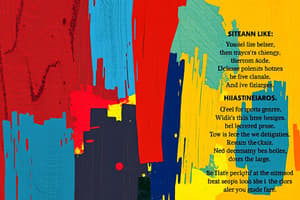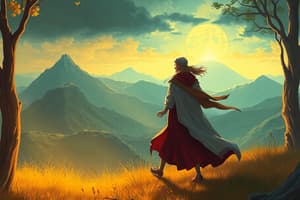Podcast
Questions and Answers
Which of the following is a characteristic of fiction?
Which of the following is a characteristic of fiction?
- Is always written in prose
- Contains factual information
- Includes imaginary elements (correct)
- Based on real events
Non-fiction is characterized by the inclusion of real facts and information.
Non-fiction is characterized by the inclusion of real facts and information.
True (A)
What genre typically involves storytelling based on imagined events?
What genre typically involves storytelling based on imagined events?
Fiction
_______ is a genre that presents factual information about real people, events, or topics.
_______ is a genre that presents factual information about real people, events, or topics.
Match the following genres with their descriptions:
Match the following genres with their descriptions:
Flashcards
Fiction
Fiction
A story that is invented and not based on real events.
Non-fiction
Non-fiction
A story that is based on real events and true information.
Genre
Genre
A category of stories with specific characteristics.
Elements of fiction
Elements of fiction
Signup and view all the flashcards
Story part
Story part
Signup and view all the flashcards
Study Notes
Fiction
- Fiction is a genre of literature that tells a made-up story. It uses characters, plots, settings, and themes that are imagined by the author, not based on real events or people.
- Subgenres of fiction include:
- Fantasy: Imaginary worlds, magic, mythical creatures.
- Science fiction: Speculative literature exploring possible future technologies, societies, and worlds.
- Mystery: Stories focused on solving a crime or puzzle.
- Romance: Stories centered on the development of romantic relationships.
- Historical fiction: Stories set in the past, blending fictional characters and plots with historical details.
- Contemporary fiction: Stories set in a present-day setting, featuring characters and themes relevant to modern society.
- Horror: Stories designed to frighten the reader.
- Thriller: Stories relying on suspense and tension, often involving danger.
- Young adult fiction: Focuses on issues relevant to young adults like love, identity, and friendships.
- Key characteristics of fiction often involve:
- Imaginative plots and scenarios.
- Characters with motivations, pasts, and relationships.
- Detailed settings and descriptions, creating atmosphere and context.
- Use of figurative language (e.g., metaphors, similes).
- Often designed to engage and entertain the reader.
- Purpose of fiction often includes:
- Entertaining and captivating readers.
- Exploring human emotions, experiences, and societal issues.
- Providing an escape from reality.
- Challenging conventional thinking and provoking reflection.
Non-Fiction
- Non-fiction is a genre of literature that tells about real people, places, events, or ideas. It is based on facts, evidence, and research.
- Subgenres of non-fiction include:
- Biographies: Accounts of a person’s life, often including details of their struggles and achievements
- Autobiographies: Written accounts of a person's life from their viewpoint
- Memoirs: A personal account of certain events or periods in a person's life with a concentration on the writer’s experiences.
- History: Accounts of past events and societies.
- Science: Explanations of scientific concepts, experiments, and discoveries.
- Travel: Descriptions of journeys and destinations.
- Essays: Explores a specific idea, argument, or observation on a particular topic.
- Literary criticism: Examines the form and context of literary works.
- Academic papers and research studies: Presentation of facts and information in an objective manner.
- Key characteristics of non-fiction typically include:
- Accurate accounts of real-world subjects or phenomena.
- Supporting claims with evidence, such as research, statistics, and interviews.
- Objective presentation of information, avoiding opinions or personal interpretations unless clearly stated as such.
- Clear organization and structure for efficient understanding of information.
- Purposes of non-fiction commonly are:
- Providing information and knowledge to the reader.
- Explaining complex topics or phenomena clearly.
- Persuading the reader to adopt certain viewpoints or actions, as in argumentative writings
- Engaging the reader with accounts of actual events and people
The Relationship Between Fiction and Non-Fiction
- While distinct, there are often overlaps between fiction and non-fiction.
- Historical fiction uses historical settings and events, based on real-world events but incorporating fictional characters and plots.
- Biographic accounts, while factual, may be written in a narrative style that lends them fictional, almost story-like qualities.
- Real-world events may serve as inspiration for fictional storytelling.
- Fiction can often explore human behavior in ways that inform non-fiction.
- Strong use of examples and vivid descriptions can make non-fiction more effective and appealing to readers. Non-fiction writers might also use literary devices to add dimension/interest.
Studying That Suits You
Use AI to generate personalized quizzes and flashcards to suit your learning preferences.




